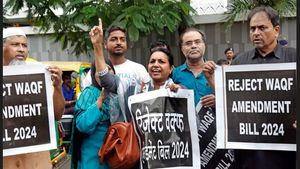Negotiations for the release of hostages held by Hamas have taken center stage following the unprecedented attacks on Israel on October 7, 2023, which resulted in over 1,200 deaths and the abduction of 251 individuals. Recent developments have witnessed the gradual release of hostages amid international discussions and diplomatic maneuvers, raising questions about the broader geopolitical dynamics involved.
Marta González Isidoro, an expert international analyst, recently shared her insights on the Onda program ‘De cara al mundo,’ where she emphasized the importance of these negotiations. She stated, 'The release of hostages allows us to remind ourselves how this new war began,' underlining the complexity of the conflict. The involvements of political entities, such as the United States and Israel, have compounded the situation, with underlying debates surrounding the ceasefire agreement’s effectiveness against Hamas’s military presence.
The release of hostages has also sparked reactions from various political figures. The Israeli government faces internal discussions about the meaningfulness of the ceasefire, where the prospects of officially terminating Hamas's influence clash with public perception and humanitarian concerns. 'The objectives set out with regard to the war seem incompatible with the images we are seeing these days,' said González Isidoro, pointing to Hamas's attempts to reshape its image as a political actor.
On November 2023, three Israeli hostages - Yarden Bibas, Ofer Kalderon, and Keith Siegel - were released, and their re-entry to Israel starkly illustrated the human toll of these negotiations. Upon their release, they appeared wearing Hamas-manufactured military-style uniforms. Yarden Bibas was welcomed home by his family, but the joyous moment was laced with sorrow as his wife and children remained captives.
Witness statements reveal the emotional and physical scars endured by the released hostages. "Yarden is home, but the home is missing," the Bibas family poignantly expressed, highlighting the deep impact of the hostage crisis on individual lives and family dynamics.
Following this drama, the BBC faced backlash when their anchor, Nicky Schiller, mistakenly referred to the released hostages as 'prisoners.' The apology issued by the BBC reflected the sensitive nature of such terminology amid the complex narratives surrounding hostage negotiations. 'At one point during the coverage, we mistakenly called the hostages ‘prisoners,’ and we would like to apologize,' emphasized the BBC anchor later, showcasing the need for careful framing when discussing such delicate matters.
International negotiations have also seen the involvement of countries like Thailand, which recently deepened diplomatic relations with Israel. Thai Foreign Minister Maris Sangiampongsa thanked Israel for facilitating the release of five Thai hostages who had endured captivity for 15 months. During discussions with Israeli President Isaac Herzog, they discussed enhancing cooperation across sectors such as agriculture and security. Maris emphasized how, 'Ongoing cooperation would strengthen people-to-people relations,' hinting at the broader goals of these diplomatic engagements.
Meanwhile, as the negotiations progressed, senior Hamas official Moussa Abu Marzouk hinted at upcoming releases, stating, 'Maxim Herkin and Sasha Trufanov will be released as priority hostages.' This announcement added urgency to the situation, with Trufanov’s imminent release serving as leverage for Hamas amid international scrutiny concerning their actions and motives.
Hamas’s strategy appears to be two-pronged: on one hand, displaying its capabilities as an influential force and, on the other, addressing humanitarian concerns by negotiating the fate of hostages with painful personal stories. These maneuvers demonstrate how hostage negotiations can carry significant political weight, reshaping perceptions and alliances.
Looking forward, the path to resolving these hostage situations remains riddled with complexity. While Turkish and Qatari influences are rising, Israel continues to reevaluate strategies to counter Hamas, showing mixed satisfaction with current outcomes. International analysts caution about the challenges of reconstructing Gaza, citing the devastation and overwhelming humanitarian needs. 'It's practically impossible to carry out rehabilitation projects with such extensive destruction and the civilian population still present,' González Isidoro noted.
This intersection of humanitarian needs and political negotiations presents both challenges and opportunities for future peace processes. The hostages' plight not only rests with their immediate families but serves as part of the larger narrative shaping the Israeli-Palestinian conflict.
Humanitarian concerns remain central to the discourse as families on both sides hope for continued dialogue. The echoes of trauma reverberate through communities as the world watches the next steps of these complicated negotiations. It’s clear the issue is far from resolved, but it currently lies at the intersection of politics, humanity, and hope.



